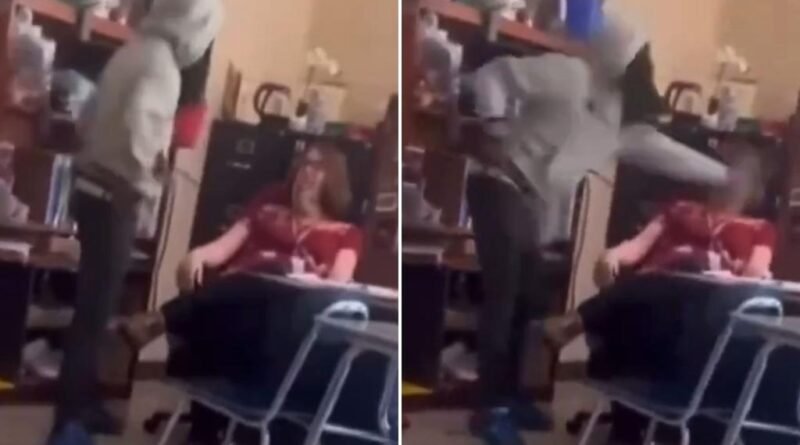Progressives have compromised school safety and put teachers at risk.
A male student Monday approached his teacher, slapped her across the face twice and subsequently taunted her, calling her a “bitch” before a laughing, mocking North Carolina classroom.
Not a day goes by that fights and beatings in schools aren’t broadcast to the world. A girl left twitching after another cracked her skull against concrete.
An 11-year-old pummeled on the ground while a crowd looked on and jeered.
 savagely beat a petite third grader on a bus.
savagely beat a petite third grader on a bus.
While I lament the violence, I’m glad so many occurrences have been caught on camera. I’ve broken up fights in schools and held students back from committing a felony while they scream “F–k your dead dad” at an opponent.
I know what schools are like now. The public needs to see and feel it viscerally for policies to change.
One-third of teachers experienced a verbal threat or harassment from students, and 14% percent reported physical violence from a student, according to a 2022 American Psychological Association survey.
Another survey confirms these aren’t routine grumbles from the old about “kids these days.”
 the near-ubiquitous abolition of school discipline.
the near-ubiquitous abolition of school discipline.
The story is always the same. Restorative-justice advocates deem discipline and adult authority oppressive, and so schools remove consequences for low-level defiance and misbehavior.
Not dumb, kids quickly learn they can get away with just about anything, and buildings and classrooms descend into chaos.
Unsurprisingly, most teachers prefer stricter discipline and report that only a handful of students create chronic disruptions.
The corrective to this devolution in school order mirrors the “broken windows” policing that reduced crime in the 1990s.
Progressives lament when schools punish children for low-level defiance, insubordination or general disrespect, imploring administrators to reserve consequences for only the severest of actions.
But this is entirely backwards — medieval even. Alexis de Tocqueville noticed — and modern social science has confirmed — that the best way to reduce criminality isn’t grand show trials and executions but rather “when justice is more certain and more mild, it is more efficacious.”
Schools must take action. If they assign a detention for dress-code infractions, misbehavior manifests as a loosened tie.
If a child receives a suspension for talking back, it communicates to his peers that rules have been and will be enforced.
If a kid loses out on recess for refusing to comply with directions, it communicates to students that basic behavior is expected, excellence encouraged and this school is the kind of place that tolerates no misbehavior.
Conversely, if we save consequences for only severe transgressions, it communicates to students that the adults expect nothing better from them, that they can get away with whatever they damn well please and that schools are no longer a place of learning, let alone safety.
Daniel Buck is a policy associate at the Fordham Institute, former English teacher and author of the book “What Is Wrong with Our Schools?



